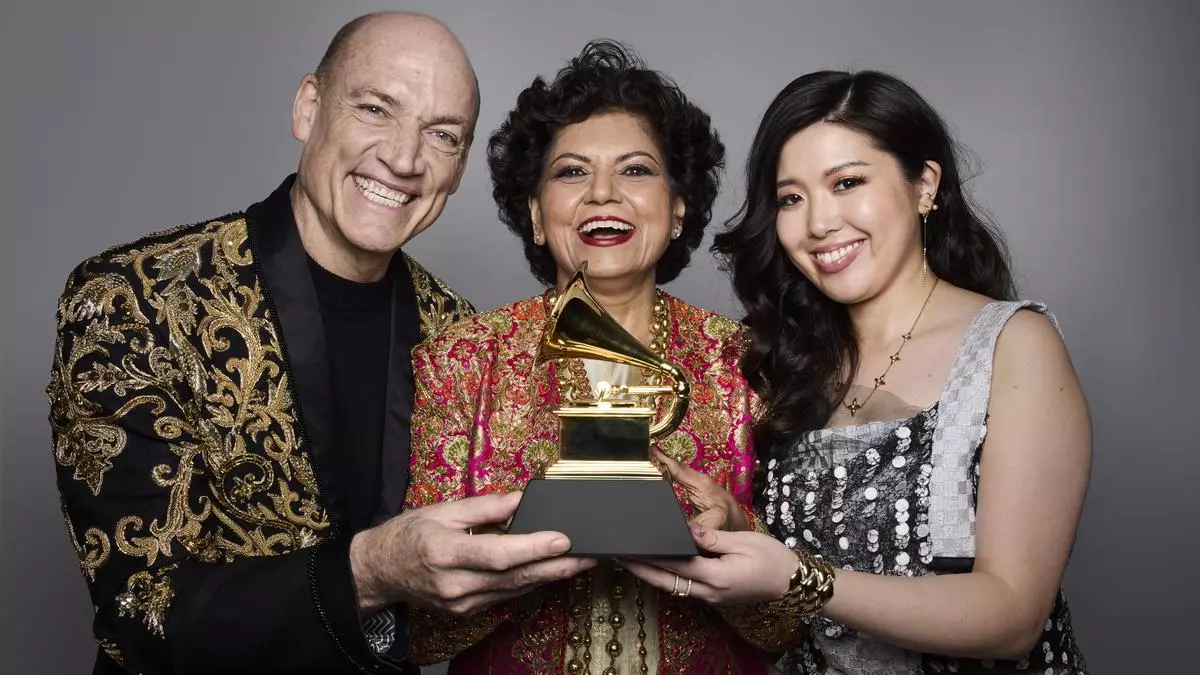When Chandrika Tandon named her album Triveni, little did the Sangam of three rivers at Prayagraj cross her mind.
Rather the ‘Triveni’ was to do with the three cultures and three different musical traditions that she, an Indian born American, Eru Matsumoto, a Japanese American cellist and Wouter Kellerman, a South African flautist represented.
But as the trio won the Grammy in the Best New Age, Ambient or Chant Album at a time when the Triveni Sangam at the Mahakumbh was globally trending, “I love to believe it was cosmic synchronicity happening,” exclaimed Tandon, who as founder and chair of Tandon Capital Associates advises several big banks and corporations.
The youthful looking seventy year old, who grew up in Chennai with the strains of MS Subbulakshmi’s Suprabhatham wafting every day, says she has been working seriously with chants for over 24 to 25 years. “I have been doing so much research over the years on Vishnu Sahasranamam, Shiva Rudram, Shanti mantras, MahaMrityunjaya mantras…” she says, pointing how “these healing mantras are powerful in their resonance, their syllables, and their energy.”
Her last album – Ammu’s Treasures – soothing lullabies for children, have a whole bunch of chants too. In Triveni, she has recomposed those chants in different ragas, adding new facets – with the flute and cello creating a new rhythm. “The idea is to popularise these chants and make them accessible to everyone,” says Tandon who believes that there is a higher purpose behind her music, which is to uplift, and heal. “I am simply an instrument producing the music – I am very focussed on the impact. And this is my philosophy across the work I do whether in business, academia or music,” says the philanthropist who has gifted $2 million to her alma mater Madras Christian College and helped it set up a B-School.
The creative process
How did Triveni happen? Tandon says that Wouter and she knew each other from the global music circle. “He called me up and asked me if I could work with him. And that is the genesis of Triveni. We were in different locations – Wouter in South Africa, Eru in Los Angeles, and I was in New York. But we got together for a few days in Manhattan, brainstorming. That’s when I came up with the notion of adding mantras. Then we created some songs around the mantras. It was not one person’s idea. It was all three of us collaborating to honour the chants with melodiousness.”
Music influences
For Tandon, who was at one time Mckinsey’s most formidable deal makers, music has been a constant companion, providing solace during challenging moments, and the influences have been many. “It started at home with the radio and my mother. I had Carnatic music training when I was younger. Then I travelled around the world, and picked up western music and jazz. Later I learnt Hindustani classical music. I had so many amazing gurus – T Viswanathan, Pandit Jasraj, Veena Sahasrabuddhe..”.
Will we see the trio in concert in India? “I hope sometime this year. I want to showcase this divine experience. We have several invitations,” exclaims Tandon.
AI in music
How does Tandon view Artificial Intelligence creeping into music? “I work with AI dramatically in my business life. But not so far in music,” she says. “Though in the music industry we are seeing the beginnings of it,” she acknowledges.
Is it good or bad? “We don’t know yet. There are multiple legal issues, ethics issues with AI, will it sound as good, will it sound exciting – I don’t know. It is unexplored territory,” says Tandon.
